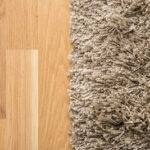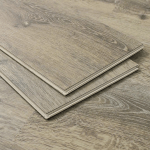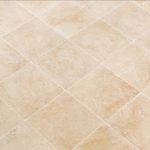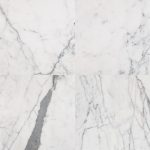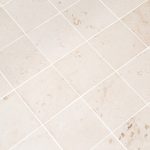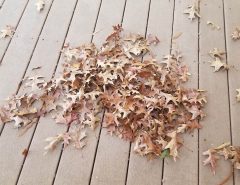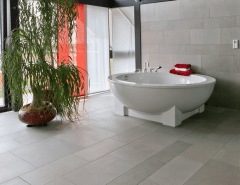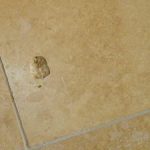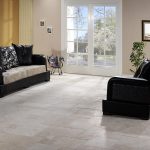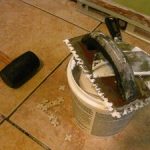Using natural stone can make any room of your home look more beautiful, but it also needs the proper care and cleaning to keep it looking new. If you’re not sure about which natural stone cleaner to use, there are a plethora of options available. From travertine and marble to granite and limestone, each type of natural stone needs a specific product or method to make sure it’s properly maintained. Before you decide which product to buy, read on to find out which ones will work best on your floors, backsplash, or countertops.
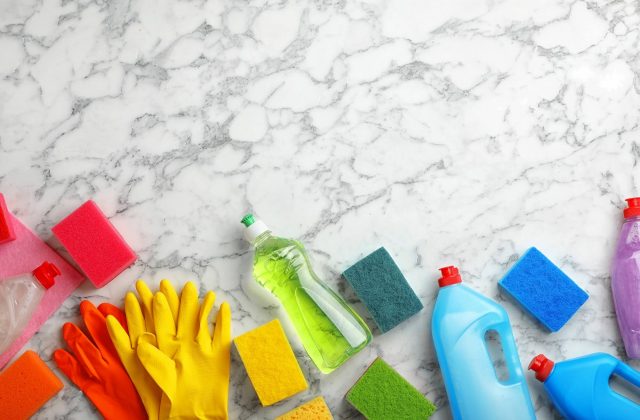
How to Best Clean Different Types of Stone
All forms of natural stone have their own unique properties. Because of this, it’s crucial to make sure you’re choosing the right natural stone cleaner. Here are the most popular types of natural stone found in most homes, and the best methods to clean them.
Travertine
You can keep your beautiful travertine tile clean by sweeping up or wiping away dust and debris regularly using a soft microfiber cloth or soft-bristled broom. Avoid using items like vinegar or anything else that’s acidic since this can eat away at the surface of travertine and cause serious damage. Instead, choose a stone-safe cleaner and seal your travertine regularly to keep it protected.
Marble
This luxurious natural stone is porous and can easily be stained or scratched. Use warm water to gently clean the surface of your marble stone and look for specific cleaners that are manufactured specifically for marble to tackle tougher cleaning jobs. Occasional sealing is also recommended.
Granite
Most commonly used for kitchen and bathroom countertops, granite is a gorgeous natural stone with unique markings. You can maintain this stone by cleaning it regularly with some mild soap and water. Granite should have a special sealer applied at least once a year to keep it looking shiny and to protect it from getting nicked and scratched.
Slate
Slate tile is a unique natural stone that has warm colorways and varying textures that make it perfect for floors. To keep your slate tiles clean, make sure the grout lines and the surface of the tiles are sealed well. When cleaning slate tile, use a non-abrasive cleaning product and make sure you rinse it away with warm water, then dry the slate thoroughly. Don’t allow water or cleaning products to sit on the surface or it could cause permanent staining.
Limestone
With beautiful color variations, limestone tile is a popular choice for feature walls, floors, and backsplashes. This stone is particularly soft and porous, so you should avoid using abrasive and acidic natural stone cleaners. Keep your limestone clean by using a mixture of mild dish soap and water to wipe stains away along with a quality sealant that will protect its vulnerable surface from permanent stains.
Avoid Acidic or Abrasive Cleaners
No matter what type of natural stone you have in your home, it’s important to stay away from products that are acidic or abrasive. Things like “scrubbing cleaners” or any product that contains an abrasive ingredient should be avoided at all costs. This material can scratch the surface of your stone, remove sealant, and leave it vulnerable to permanent stains. You should also avoid anything that has a high pH level or that’s acidic in any way. This includes things like vinegar or any fruit-based natural stone cleaners or lemon juice. Always choose something with mild ingredients or stick with a mixture of gentle soap and water to keep your stone clean.
Invest in a Surface Sealant
The best way to maintain your natural stone is by sealing it on a regular basis. You can purchase stone sealants online or at most hardware stores, and they’re easy to apply. The sealant will keep stains out and protect your stone to keep it looking new. Follow the directions as indicated by the manufacturer and let the sealant completely dry before you use your stone floors or countertops. A sealant will not only protect your floors and walls, but it makes cleaning a whole lot easier. The sealant provides a smooth surface that makes wiping up messes and spills a breeze. It also creates a protective barrier that resists moisture so nothing can penetrate the surface of your stone tiles.

Calcareous Stone vs. Siliceous Stone
There are two main types of natural stone that you can use in your home: calcareous and siliceous stone. Let’s examine these two main types so you have a better idea of the best methods to clean each:
• Calcareous stone is extremely sensitive to natural stone cleaners that contain alkaline or that have high levels of acidity. The most popular examples for use in your home include stone like travertine, marble, or limestone. This stone is made up of mostly calcium bicarbonate and is extremely porous which means it’s susceptible to stains and damage. Always apply a high-quality sealant and maintain calcareous stone on a regular basis to keep it clean and beautiful.
• Siliceous stone is more durable than calcareous stone and is slightly easier to maintain. You may use a mild acidic solution on this type of stone if you have to, but you should avoid it whenever possible. Examples of siliceous stone include slate, granite, and sandstone. This type of natural stone is made up of small particles that are mostly comprised of silica or quartz.
Making a Natural Stone Cleaner vs. Buying One
If you’re looking for an easy way to keep your stone floors or countertops clean, you can purchase special cleaners, or you can make one yourself at home. When you make a natural stone cleaner, it’s less expensive and you can typically make them with items you probably already keep in your home. For most types of stone, a mixture of mild dish soap and water will suffice. You can also make a gentle, non-abrasive cleaning paste by mixing some flour and water together and using it to gently scrub away tough stains.
If you decide to use a store-bought stone cleaner, make sure you read the ingredients and all labels carefully. Anything with acidic chemicals or harsh abrasives can damage your stone. Look for cleaners that are made for your specific type of stone, as formulas can vary depending on which type of stone you have. With the right combination of proper maintenance, a stone sealer, and a high-quality cleaner, your natural stone should look beautiful and like new for many years to come.


